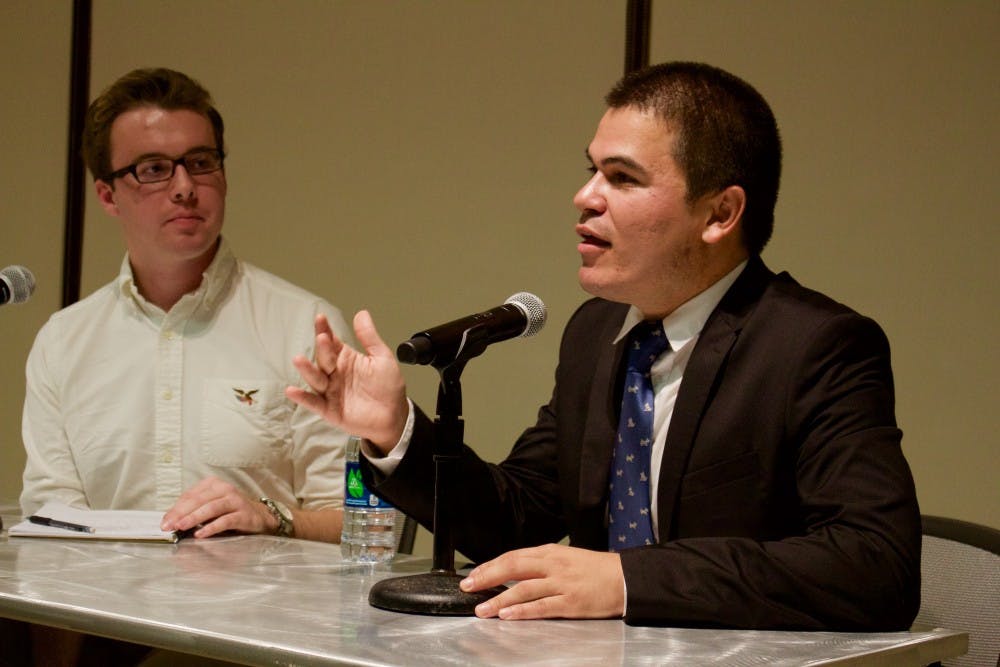The Roosevelt Institute, AU’s policy making progressive think tank, hosted Pay Our Interns founder and AU alum Carlos Mark Vera on Oct. 4.
Vera, who was recently named an influential Latino by NBC, fought for workers rights on campus, specifically staff employed by Aramark. He spoke about his activism at AU and his latest project, Pay Our Interns, an organization that advocates for creating more public and private sector paid internships.
When Vera attended AU, he built strong relationships with the workers and quickly found out that they were being “exploited,” he said.
“I started getting really close to a lot of the cooks and the cleaners,” Vera said.
“Being one of the few students of color back then, I just kind of bonded with the workers and once I started getting to know them, I started realizing that there were some problems. Workers would be mistreated, exploited and overworked. I wanted to do something, but I was advised to shut up and ignore it because the administration would not like it.”
When Vera interned at the White House, he called an Aramark employee to give her a tour. She was unable to come because she was bedridden from an accident in Anderson Hall, Vera said. This was the breaking point when Vera realized he needed to quickly take action, he said.
“At that moment, I felt so much anger, because I knew that what was happening to her was not incidental,” Vera said. “She had an accident in Anderson Hall… and she was injured and she asked for a lighter workload and they never gave that to her. So, as a result of working so hard, she ended up not being able to walk for about a month.”
Workers face difficulties with management and mistreatment by Aramark, and one worker’s death was not announced by the University, he said. Additionally, children of Aramark workers did not receive full-tuition scholarships, while children of faculty and other staff members did.
In response to this, Vera launched Exploited Wonk, and “released documents, stories, testimonials of what was going on.”
Vera rallied students and student organizations to join him in pushing the administration to act. He met with former President Neil Kerwin, went to Student Government to mobilize support and strategize, and met with the Faculty Senate, he said.
“I realized that to get change it is not enough to just make a lot of noise, you need to have a strategy,” Vera said.“The winning formula for organization happened to be making sure you have grassroots support, but also constitutional support.”
Vera said he succeeded in securing full-tuition scholarships for workers’ dependents through all of his extensive planning. He said it was important for him to negotiate with the administration and listen to what they had to say.
“Intentions are not enough,” Vera said. “You get things more with honey than with vinegar.”
While Vera was a student at AU, he completed several internships, at least some of which were unpaid, making it difficult for him to balance the internship with his other job and academics.
The average cost for a student to even have an unpaid internship in Washington, D.C. is thousands of dollars, Vera said.
Vera said that for low income students, unpaid internships were even more of a strain, given that the cost of tuition is already high. For all of these reasons, Vera started Pay Our Interns to encourage more public and private sector paid internships.
The organization has been successful in lobbying several representatives and pushing them to change their minds about paying their interns. They are continuing this effort and plan on growing to the national level, Vera said.
“As millennials, we are always underestimated,” Vera said.
Vera encouraged everyone to be an activist and advocate against any injustice that someone may see.
“You guys can get a lot done,” he said “One thing I have learned looking back is yes, be bold in whatever work you want to do, but at the same time, be realistic. I encourage you guys to do it [activism], because it is not impossible.”





